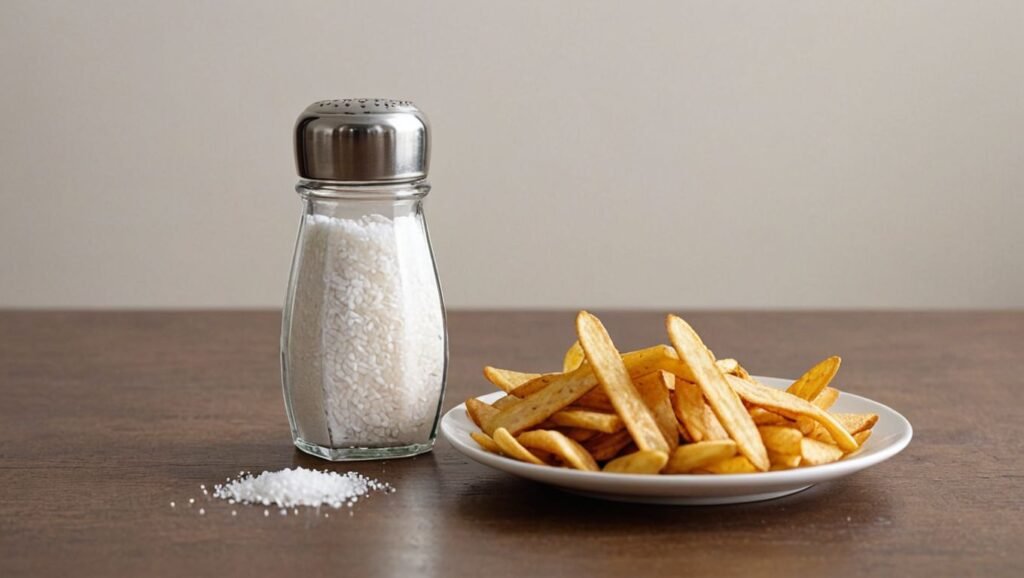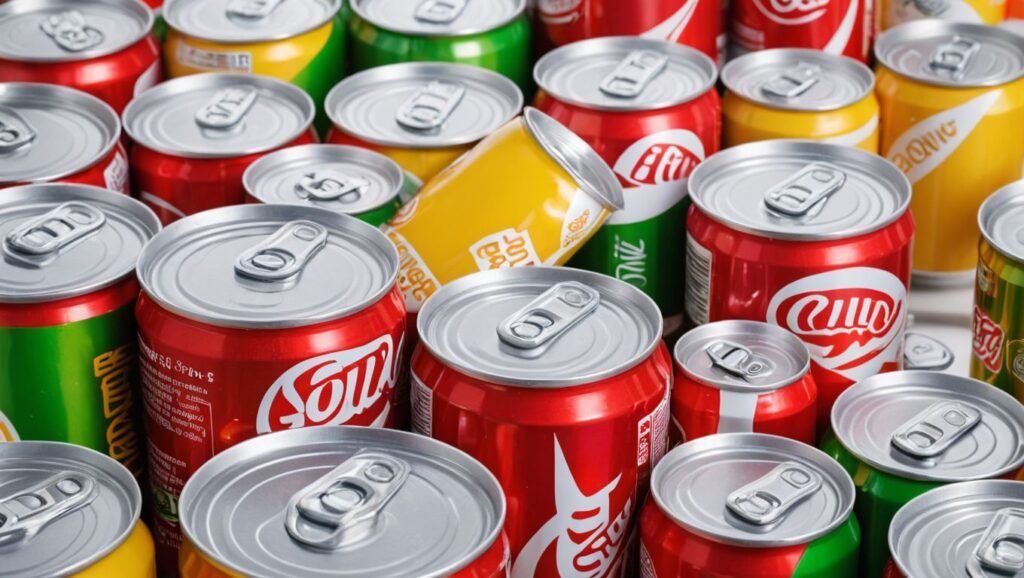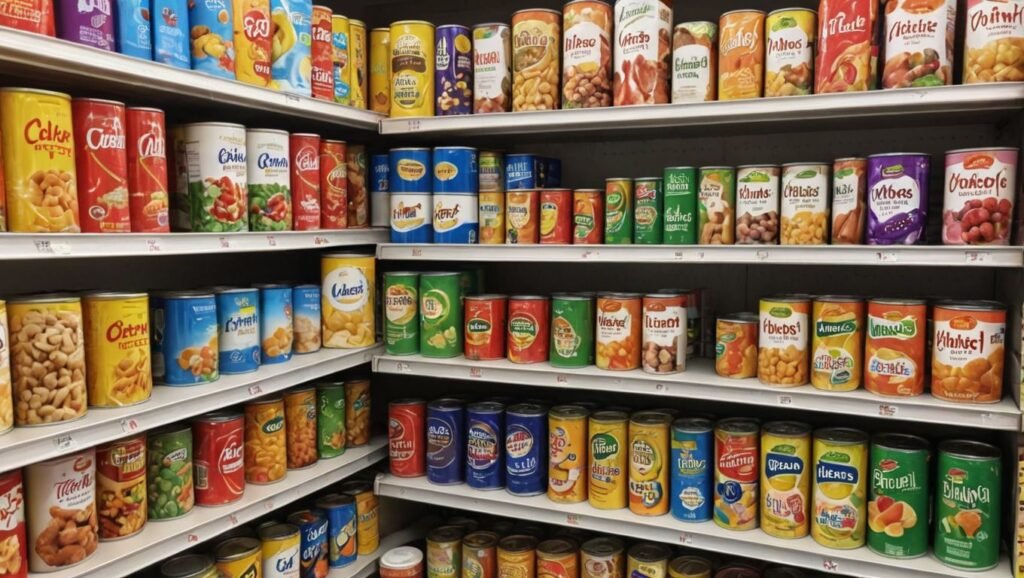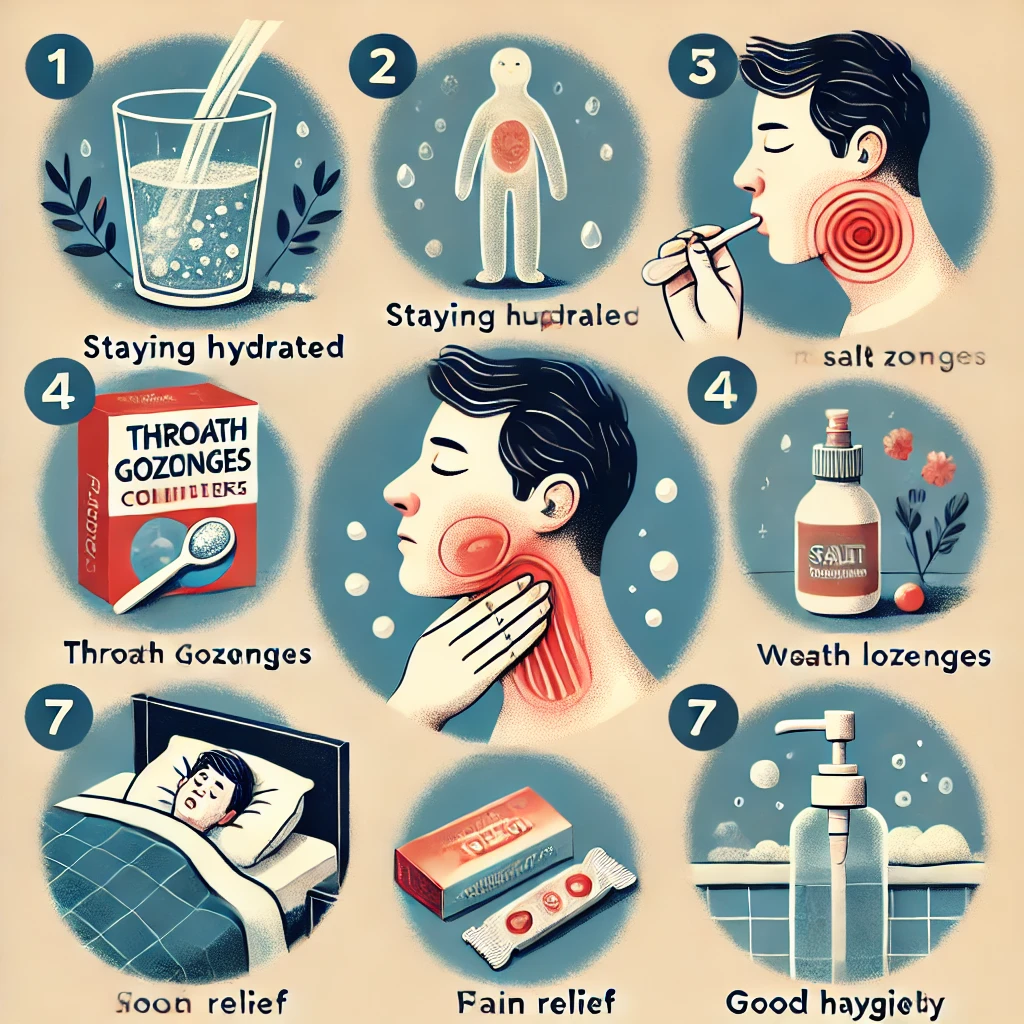
7 Toxic Foods to Avoid for a Healthier, Happier Life
Discover 7 toxic foods to eliminate for improved health and well-being. Make informed dietary choices for a happier life.


1. Introduction
Overview of the Importance of Avoiding Toxic Foods In today’s world, being conscious of what we consume is more critical than ever. Many common foods found in our kitchens may pose health risks due to the presence of harmful substances, additives, and preservatives. By identifying and avoiding these toxic foods, we can significantly reduce the risk of chronic diseases, improve our overall health, and enhance our quality of life. Understanding the potential dangers of these foods empowers us to make informed dietary choices and prioritize our well-being.
Brief Mention of What Will Be Covered in the Article This article will explore seven toxic foods commonly found in our kitchens that we should be cautious about. These include processed meats, artificial sweeteners, high-fructose corn syrup, trans fats, refined grains, additives and preservatives, excessive salt, pesticide-contaminated produce, and canned foods. For each of these toxic foods, we will discuss the associated health risks, provide examples, and offer healthier alternatives to incorporate into our diets.
2. Toxic Foods: Processed Meats
Health Risks Associated with Processed Meats Processed meats, such as sausages, hot dogs, bacon, and deli meats, have been linked to various health issues. These meats often contain high levels of sodium, nitrates, and preservatives, which can increase the risk of hypertension, heart disease, and certain types of cancer. The consumption of processed meats has also been associated with an increased likelihood of developing colorectal cancer. Reducing or eliminating processed meats from your diet can significantly improve your long-term health.
Common Examples of Processed Meats
- Sausages: Breakfast sausages, bratwurst, and other flavored sausages are often high in sodium and preservatives.
- Hot Dogs: A popular convenience food, hot dogs contain nitrates and additives that can be harmful to health.
- Bacon: While delicious, bacon is high in saturated fat and sodium, contributing to heart disease and other health issues.
- Deli Meats: Sliced deli meats, such as ham, turkey, and roast beef, often contain preservatives and are high in sodium.
Alternative Healthier Options
- Fresh, Lean Meats: Opt for fresh cuts of lean meats such as chicken breast, turkey, and lean beef. These do not contain harmful additives or preservatives.
- Plant-Based Proteins: Incorporate plant-based protein sources like beans, lentils, tofu, and tempeh into your diet. These options are often lower in sodium and free from harmful preservatives.
- Homemade Alternatives: Prepare your own sausage and deli meat alternatives at home using fresh ingredients and natural seasonings.

3. Toxic Foods: Artificial Sweeteners
Potential Dangers of Artificial Sweeteners Many foods and beverages commonly use artificial sweeteners as sugar substitutes, but their safety has been a subject of debate for years. Some studies suggest that artificial sweeteners may have negative health effects, including:
- Increased Risk of Metabolic Disorders: Artificial sweeteners have been linked to disruptions in glucose metabolism, potentially increasing the risk of metabolic disorders such as type 2 diabetes.
- Altered Gut Microbiota: These sweeteners can negatively impact gut health by altering the balance of beneficial bacteria, leading to digestive issues and inflammation.
- Weight Gain and Appetite Changes: Contrary to their intended purpose, artificial sweeteners may contribute to weight gain by increasing cravings for sugary foods and altering appetite regulation.
- Potential Carcinogenic Effects: Some research has raised concerns about the potential carcinogenic effects of certain artificial sweeteners, though more studies are needed to confirm these findings.
Common Artificial Sweeteners to Avoid
- Aspartame: Found in many diet sodas, sugar-free gum, and low-calorie products. Studies have linked it to headaches, dizziness, and potential neurotoxic effects.
- Splenda, also known as sucralose, is a common ingredient in a variety of sugar-free and diet products. It has been associated with negative impacts on gut health.
- Saccharin: Animal studies have linked saccharin, a common ingredient in tabletop sweeteners and some diet foods, to bladder cancer.
- Acesulfame Potassium (Ace-K): Found in sugar-free beverages, baked goods, and processed foods. Some studies suggest it may have negative effects on metabolism and gut health.
Natural Sweetener Alternatives
- Stevia: Derived from the leaves of the Stevia plant, stevia is a natural, zero-calorie sweetener that does not raise blood sugar levels.
- Monk Fruit Extract: Also known as lo han guo, monk fruit extract is a natural sweetener that is much sweeter than sugar and contains zero calories.
- Honey: A natural sweetener with antioxidant and antibacterial properties. Use it in moderation due to its high-calorie content.
- Maple Syrup: A natural sweetener rich in antioxidants and minerals. Choose pure maple syrup and use it sparingly.
- Coconut Sugar: A lower-glycemic alternative to regular sugar, coconut sugar retains some of the nutrients found in the coconut palm.

4. Toxic Foods: High-Fructose Corn Syrup
Health Effects of High-Fructose Corn Syrup High-fructose corn syrup (HFCS) is a widely used sweetener in many processed foods and beverages. Consuming HFCS can lead to several adverse health effects, including:
- Increased Risk of Obesity: Because of its high calorie content and effect on insulin regulation, HFCS increases the risk of weight gain and obesity.
- Insulin Resistance and Type 2 Diabetes: Regular consumption of HFCS can contribute to insulin resistance, increasing the risk of developing type 2 diabetes.
- Liver Fat Accumulation: HFCS is metabolized differently than glucose, leading to increased fat accumulation in the liver, which can result in non-alcoholic fatty liver disease (NAFLD).
- Elevated Triglycerides and Cholesterol: HFCS can raise triglyceride and LDL cholesterol levels, contributing to cardiovascular disease.
- Increased Appetite and Cravings: HFCS may disrupt the hormones that regulate hunger and satiety, leading to increased appetite and cravings for sugary foods.
Foods Commonly Containing High-Fructose Corn Syrup HFCS is prevalent in many processed foods and beverages. Some common examples include:
- Sodas and Soft Drinks: HFCS is a primary sweetener in many carbonated beverages.
- Sweetened Fruit Juices: Many fruit juices and fruit-flavored drinks contain added HFCS.
- Packaged Snacks: Items such as cookies, crackers, and snack bars often contain HFCS.
- Breakfast Cereals: Many popular breakfast cereals, especially those marketed to children, contain HFCS.
- Condiments and Sauces: Ketchup, barbecue sauce, and salad dressings frequently contain HFCS.
- Baked Goods: Commercially produced cakes, pastries, and bread may contain HFCS.
Healthier Sweetening Options
- Natural Sweeteners: Use natural sweeteners such as honey, maple syrup, and coconut sugar, which are less processed and have some nutritional benefits.
- Stevia: A natural, zero-calorie sweetener derived from the Stevia plant. It does not raise blood sugar levels.
- Monk Fruit Extract: Also known as lo han guo, this natural sweetener is much sweeter than sugar and contains zero calories.
- Agave Nectar: A natural sweetener derived from the agave plant. Use it sparingly due to its high fructose content.
- Pureed Fruits: Use pureed fruits like bananas or applesauce as a natural sweetener in baking and cooking.
5. Toxic Foods: Trans Fats
Negative Health Impacts of Trans Fats Trans fats are a type of unhealthy fat commonly found in processed and fried foods. Consuming trans fats can have several negative health effects, including:
- Increased Risk of Heart Disease: Trans fats raise LDL (bad) cholesterol levels and lower HDL (good) cholesterol levels, leading to an increased risk of heart disease and stroke.
- Inflammation: Trans fats can cause inflammation in the body, contributing to chronic conditions such as arthritis and diabetes.
- Weight Gain: Foods high in trans fats are often calorie-dense and can lead to weight gain and obesity.
- Insulin Resistance: Trans fats can interfere with insulin function, increasing the risk of type 2 diabetes.
- Negative Impact on Brain Health: Research has linked trans fats to cognitive decline and an increased risk of developing Alzheimer’s disease.
Foods Typically High in Trans Fats Various processed and fried foods commonly contain trans fats. Some examples include:
- Fried Foods: Foods like fried chicken, french fries, and doughnuts frequently cook in oils that are high in trans fats.
- Baked Goods: Commercially produced cakes, cookies, pastries, and pie crusts often contain trans fats to extend shelf life.
- Margarine and Shortening: Some types of margarine and vegetable shortening are high in trans fats.
- Snack Foods: Chips, crackers, and microwave popcorn may contain trans fats.
- Processed Foods: Many processed and packaged foods, such as frozen pizzas and ready-to-eat meals, contain trans fats.
Trans Fat-Free Alternatives
- Use Healthier Oils: Opt for cooking oils that are free from trans fats, such as olive oil, coconut oil, and avocado oil.
- Choose Whole Foods: Prioritize whole, unprocessed foods such as fruits, vegetables, lean meats, and whole grains.
- Read Labels: Look for products labeled “trans fat-free” or check the ingredient list for partially hydrogenated oils, which indicate the presence of trans fats.
- Homemade Baked Goods: Make your own baked goods using healthier ingredients and trans fat-free oils.
- Air Frying: Use an air fryer to cook foods with less oil, resulting in healthier, crispy options.
6. Toxic Foods: Refined Grains
Adverse Effects of Consuming Refined Grains Processing has stripped refined grains of their valuable nutrients, including fiber, vitamins, and minerals. Consuming refined grains can have several negative health effects:
- Blood Sugar Spikes: Refined grains can cause rapid spikes and crashes in blood sugar levels, leading to energy fluctuations and increased hunger.
- Weight Gain: Foods made with refined grains are often calorie-dense and lack the fiber that helps keep you full, contributing to weight gain.
- Increased Risk of Chronic Diseases: A diet high in refined grains has been linked to an increased risk of type 2 diabetes, heart disease, and certain cancers.
Examples of Refined Grains in Common Foods
- White Bread: Made from refined wheat flour, white bread lacks the nutrients found in whole grains.
- White Rice: Refined rice has been stripped of its bran and germ, removing essential nutrients.
- Pasta: Often made from refined wheat flour, traditional pasta lacks the fiber and nutrients of whole grain pasta.
- Pastries and Baked Goods: Refined flour, added sugars, and unhealthy fats are common ingredients in many pastries, cookies, and cakes.
Whole Grain Alternatives
- Whole Wheat Bread: Opt for bread made with whole wheat flour, which retains its nutrients and fiber.
- Brown Rice: Choose brown rice, which contains the bran and germ, providing more nutrients and fiber.
- Whole Grain Pasta: Select pasta made from whole grains, such as whole wheat or quinoa pasta, for added nutrients.
- Oats: Incorporate whole oats into your diet for a nutritious and fiber-rich option.
Image Prompt: “Slices of white bread and a bowl of refined pasta.”
- Alt Text: Slices of white bread and a bowl of refined pasta.
7. Toxic Foods: Additives and Preservatives
Harmful Effects of Food Additives and Preservatives Often used to enhance flavor, texture, and shelf life, food additives and preservatives can have harmful effects on health.
- Allergic Reactions: Some additives and preservatives can cause allergic reactions and sensitivities in certain individuals.
- Digestive Issues: Additives like artificial colors and sweeteners can disrupt gut health and cause digestive problems.
- Increased Risk of Chronic Diseases: Research has linked some preservatives, like nitrates and sulfites, to an increased risk of cancer and other chronic diseases.
Common Additives and Preservatives to Avoid
- Monosodium Glutamate (MSG): Frequently utilized as a flavor enhancer, MSG has been associated with headaches and other adverse reactions.
- Artificial Colors: Synthetic dyes can cause hyperactivity and behavioral issues in children and may have other health risks.
- Sodium Nitrate and Nitrite: Used in processed meats, these preservatives are associated with an increased risk of certain cancers.
- Processed foods contain BHA and BHT, two preservatives that may have carcinogenic effects.
Natural Preservative Options
- Lemon Juice: A natural preservative that can help prevent oxidation and spoilage.
- Vinegar: Used for pickling and preserving, vinegar has antimicrobial properties.
- Salt: A traditional preservative used for curing and preserving foods.
- Rosemary Extract: Contains antioxidants that can help preserve the freshness of foods.

8. Toxic Foods: Excessive Salt
Health Risks of High Salt Consumption Excessive salt consumption can have several adverse health effects, including:
- High Blood Pressure: Consuming too much salt can raise blood pressure, increasing the risk of heart disease and stroke.
- Kidney Damage: High salt intake can strain the kidneys, leading to kidney disease or worsening existing conditions.
- Fluid Retention: Excessive salt can cause the body to retain water, leading to bloating and swelling.
- Osteoporosis: High salt intake can lead to calcium loss from bones, increasing the risk of osteoporosis.
- Stomach Cancer: Some studies suggest a link between high salt consumption and an increased risk of stomach cancer.
Foods High in Salt to Be Cautious Of
- Processed Meats: Deli meats, sausages, and bacon are often high in sodium.
- Canned Soups: Many canned soups contain high levels of salt to enhance flavor and preserve shelf life.
- Snack Foods: Chips, pretzels, and salted nuts are common high-sodium snacks.
- Frozen Meals: Pre-packaged frozen meals often contain large amounts of sodium.
- Condiments: Soy sauce, ketchup, and salad dressings can be significant sources of hidden salt.
- Cheese: Some types of cheese, especially processed varieties, contain high levels of salt.
Lower-Sodium Alternatives
- Fresh, Whole Foods: Opt for fresh fruits, vegetables, and lean meats that are naturally low in sodium.
- Homemade Meals: Prepare meals at home to control the amount of salt used.
- Herbs and Spices: Use herbs, spices, and salt-free seasoning blends to add flavor without the added sodium.
- Low-Sodium Products: Choose low-sodium or no-salt-added versions of canned goods, soups, and condiments.
- Limit Processed Foods: Reduce consumption of processed and packaged foods, which are often high in sodium.
9. Toxic Foods: Pesticide-Contaminated Produce
Pesticides on Produce: While pesticides shield crops from pests and diseases, they can also pose health risks to humans. These risks include:
- Hormone Disruption: Some pesticides can interfere with the endocrine system, affecting hormone levels and reproductive health.
- Neurological Effects: Exposure to certain pesticides has been linked to neurological disorders, such as Parkinson’s disease.
- Cancer: Long-term exposure to pesticides may increase the risk of certain cancers.
- Developmental Issues: Pesticides can impact the development of children, leading to learning disabilities and behavioral problems.
Commonly Contaminated Fruits and Vegetables Certain fruits and vegetables are more likely to contain pesticide residues. Some examples include:
- Strawberries: Often found to have high levels of pesticide residues.
- Spinach: Frequently contaminated with various pesticides.
- Apples: To keep pests at bay, apple orchards frequently use pesticides.
- Grapes: Both domestic and imported grapes can have pesticide residues.
- Tomatoes: Pesticides are often used in tomato cultivation.
Tips for Choosing Organic Produce
- Buy Organic: Choose organic fruits and vegetables, which are grown without synthetic pesticides.
- Wash Thoroughly: Wash produce under running water to remove surface pesticides. Use a brush for thicker-skinned produce.
- Peel When Possible: Peeling fruits and vegetables can help reduce pesticide residues.
- Grow Your Own: Consider growing your own fruits and vegetables to control the use of pesticides.
- Check the EWG Guide: Refer to the Environmental Working Group’s (EWG) “Dirty Dozen” and “Clean Fifteen” lists to identify the most and least contaminated produce.
10. Toxic Foods: Canned Foods
Dangers of BPA and Other Chemicals in Canned Foods Bisphenol A (BPA) is a chemical commonly used in the lining of canned foods. BPA and other chemicals in canned foods can pose health risks, including:
- Hormone Disruption: BPA can mimic estrogen and disrupt the endocrine system, potentially leading to reproductive issues and hormone imbalances.
- Increased Cancer Risk: Some studies have linked BPA exposure to an increased risk of certain cancers, such as breast and prostate cancer.
- Developmental Problems: BPA exposure during pregnancy and early childhood may impact brain development and behavior.
- Cardiovascular Issues: BPA has been associated with an increased risk of heart disease and hypertension.
Common Canned Foods with Potential Risks
- Canned Soups: Often contain BPA in the lining and high levels of sodium.
- While convenient, canned vegetables may contain BPA contamination.
- Canned Fruits: BPA can leach into fruits packed in syrup or juice.
- Canned Fish and Meat: These products may contain BPA and other preservatives.
Safer Alternatives to Canned Foods
- Fresh or Frozen Produce: Opt for fresh or frozen fruits and vegetables instead of canned versions.
- Glass Jars: Choose products packaged in glass jars, which do not contain BPA.
- BPA-Free Cans: Look for cans labeled as BPA-free.
- Home Canning: Preserve foods at home using glass jars and BPA-free lids.
- Cook Fresh: Whenever possible, cook fresh meals using whole ingredients.

11. Conclusion
Recap of the Toxic Foods to Avoid for Better Health Throughout this article, we have explored seven toxic foods commonly found in our kitchens that can pose significant health risks. By identifying and avoiding these foods, we can improve our overall health and well-being. Here’s a quick recap of the toxic foods to avoid:
- Processed Meats: Linked to cancer, heart disease, and hypertension.
- Artificial Sweeteners: Associated with metabolic disorders, altered gut health, and potential carcinogenic effects.
- High-Fructose Corn Syrup: Contributes to obesity, diabetes, liver fat accumulation, and cardiovascular disease.
- Trans fats increase the risk of heart disease, inflammation, weight gain, and cognitive decline.
- Refined Grains: Causes blood sugar spikes, weight gain, and an increased risk of chronic diseases.
- Additives and Preservatives: Linked to allergic reactions, digestive issues, and increased cancer risk.
- Excessive Salt: Contributes to high blood pressure, kidney damage, fluid retention, osteoporosis, and stomach cancer.
- Pesticide-Contaminated Produce: Poses risks of hormone disruption, neurological effects, cancer, and developmental issues.
- Canned Foods: Contain BPA and other chemicals that disrupt hormones and increase cancer risk.
Encouragement to Make Informed Dietary Choices Making informed dietary choices is essential for maintaining a healthy and vibrant life. By being aware of the potential dangers of toxic foods and opting for healthier alternatives, you can take control of your health and reduce the risk of chronic diseases. Remember, small changes in your diet can lead to significant improvements in your overall well-being. Take the time to read labels, choose whole and organic foods, and prioritize fresh, unprocessed ingredients. Your body and mind will thank you for the effort.
Final Thoughts and Additional Resources Avoiding toxic foods is just one aspect of a holistic approach to health and wellness. Embrace a balanced lifestyle that includes regular physical activity, adequate sleep, stress management, and self-care practices. By integrating these habits into your daily routine, you can achieve optimal health and happiness.
For additional resources and support, consider exploring:
- Books and Articles: Look for reputable sources on nutrition, food safety, and healthy living.
- Online Courses and Webinars: Enroll in courses that provide in-depth knowledge and practical tips for maintaining a healthy diet.
- Support Groups and Communities: Join groups that offer encouragement, accountability, and shared experiences on the journey to better health.
- Professional Guidance: Consult with nutritionists, dietitians, or healthcare professionals for personalized advice and support.
I wish you all the best on your journey to a healthier, happier life! 🌟🥗🍎




One Comment
Pingback: